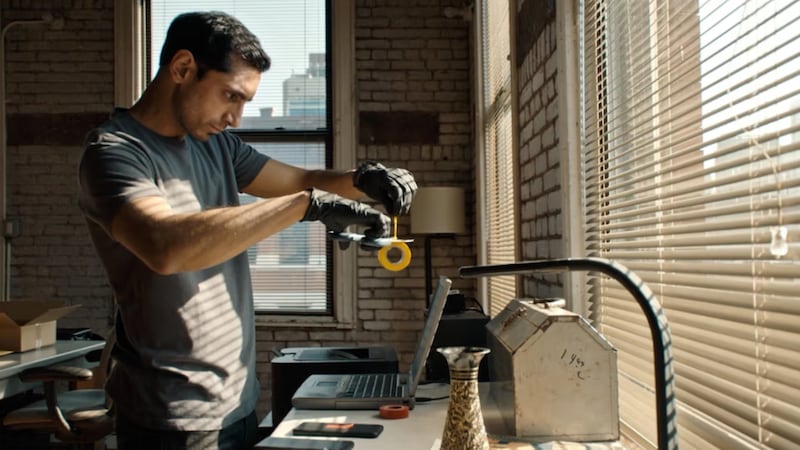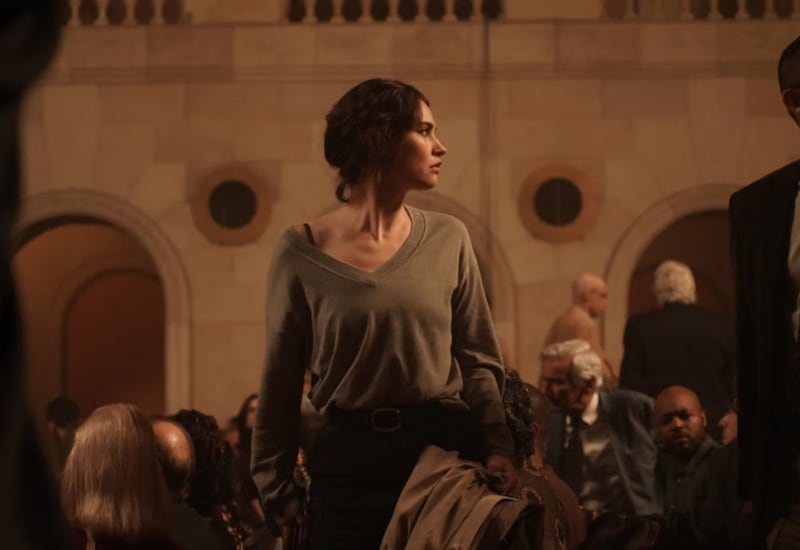In the underworld, violating established codes of conduct is a surefire way to court trouble—if not wind up in the morgue.
Riz Ahmed’s middleman learns that lesson at great personal cost in Relay, a noir-y thriller from director David Mackenzie (Hell or High Water) that channels ’70s American cinema for a breakneck tale about a secretive sphere and the complicated processes that govern it. Like the best of its genre, it affords tantalizing entrée into a universe lurking just below society’s surface to which few are privy, and stages engrossing cloak-and-dagger games between players who know the rules and, more dangerously, how to break them.
Written with economical precision by Justin Piasecki, Relay, which hits theaters Aug. 22, is a tale of corporate espionage. That becomes immediately evident thanks to a late-night Manhattan diner meeting between nervous, battered Hoffman (Matthew Maher) and well-dressed McVie (Victor Garber), whose appearance and comportment radiate CEO power.
The reason for this sit-down is a transfer of documents, the agreement being that McVie—who runs Optimo Pharmaceuticals—will leave Hoffman alone in exchange for receiving the classified files the employee stole from the office. Though he thought about being a whistleblower, Hoffman now just wants his life back, and as an insurance policy to guarantee that McVie holds up his end of the bargain, a copy of this sensitive material is being stored for safekeeping with another individual.
That third party is Ash (Ahmed), who works as an intermediary for those who’ve seen disconcerting things at their jobs, and need help extricating themselves from difficult messes. Mackenzie’s film tells by showing, following Ash as he moves about his preferred professional spaces—a spartan apartment, the public library to use the Internet, a Newark warehouse that doubles as his headquarters—as well as communicates with clients in a most unusual way.
In order to maintain strict anonymity, Ash uses a device for the deaf that resembles a typewriter (save for its slender digital screen) and allows him to type messages that are then read to callers via operators at the Tri-State Relay service. This business lets the hearing or speech-impaired chat on the phone, and for Ash, it protects his identity (his voice, his phone number, his whereabouts) in every respect.
This is an exceedingly shrewd means of staying off the grid in 2025, and Ash uses his methods to broker deals as a supposedly neutral party. Still, Ash is clearly on the side of the little guy, and those like McVie—whose rep lets Ash know that he’s “parasitic scum”—know it.

Having successfully closed the book on his Hoffman assignment (earning himself a healthy fee in the process), the loner is contacted by Sarah Grant (Lily James), a scientist in possession of documents which prove that her former biotech employer Cybo Sementis is ignoring warning signs about the genetically modified wheat it’s about to roll out nationwide and is central to the company’s upcoming acquisition. Sarah imagined she was going to expose Cybo Sementis’ cover-up in the name of the greater good. However, in the face of her dismissal and mounting harassment, she wants to be done with it all, trading her confidential report for the freedom to walk away unbothered.
This is in Ash’s wheelhouse, and after independently verifying Sarah’s story, he agrees to help, beginning with a canny stunt in which he has her fly from Newark to Pittsburgh and then on to Atlanta, all so he can smoke out those who are on her tail.
Sure enough, she’s being followed by a team of corporate fixers led by Dawson (Sam Worthington), whose aim is to retrieve the documents without paying Ash’s $500,000 fee (if not silencing Sarah permanently). Mackenzie orchestrates this ruse with clean, suspenseful exactitude, lucidly laying out the mechanisms of Ash’s scheme through expert staging that requires minimal dialogue. On the heels of its earlier passages, this sequence’s confidence and cleverness puts the film on solid (if shifting) ground, and from there, Relay moves at a swift and tense pace, full of visits to post offices and Grand Central Station, trips on Metro-North trains, and the employment and disposal of burner phones.
Chases and shootouts are also in the cards, albeit not until things get dodgier for everyone involved. James’ Sarah is a nervous wreck whose desire to follow Ash’s strict instructions isn’t equal to her ability, and her carelessness is the wrench in Ash’s plans, forcing him to consider taking unwise actions.

With Ash caught between adherence to his system and ideals, and his growing fondness for Sarah, Relay taps into a classic noir vein. His dilemma is exacerbated by both his struggles with alcoholism (he attends AA) and the complicated guilt and shame he feels over prior mistakes as well as his current career helping desperate people extricate themselves from trouble (which is good) by facilitating the return of damning goods to evil conglomerates (which is bad).
Shot on location on crowded streets and sidewalks, and in no-name restaurants, empty parking garages, and dimly lit warehouses, Relay is New York through and through, and the city’s breakneck energy perfectly complements Ash and Sarah’s perilous predicament.
Slightly less convincing are Ash and Sarah’s budding feelings for each other; no matter that they’re both harried and lonely, their sparks—in light of the fact that they don’t actually know each other—feel like narrative contrivances. Still, that’s a minor blip on an otherwise smooth ride, which gets scarier once Sarah’s slip-ups cause Ash to risk everything to keep the deal on track.

Between Ahmed’s stoic if tormented performance, James’ frazzled and upset turn, and Worthington’s vicious, calculating routine, Relay is as rich in personality as it is in formal skill.
Furthermore, it has a few surprises up its sleeve that reconfigure all that came before, and which speak to the slipperiness of good and evil, and truth and lies, in this most fraught of under-the-radar arenas. Considering the bleak ancestors whose spirit it channels, its finale is a tad too comforting. Yet on the whole, it’s a throwback that excellently straddles the line between the past and present.









